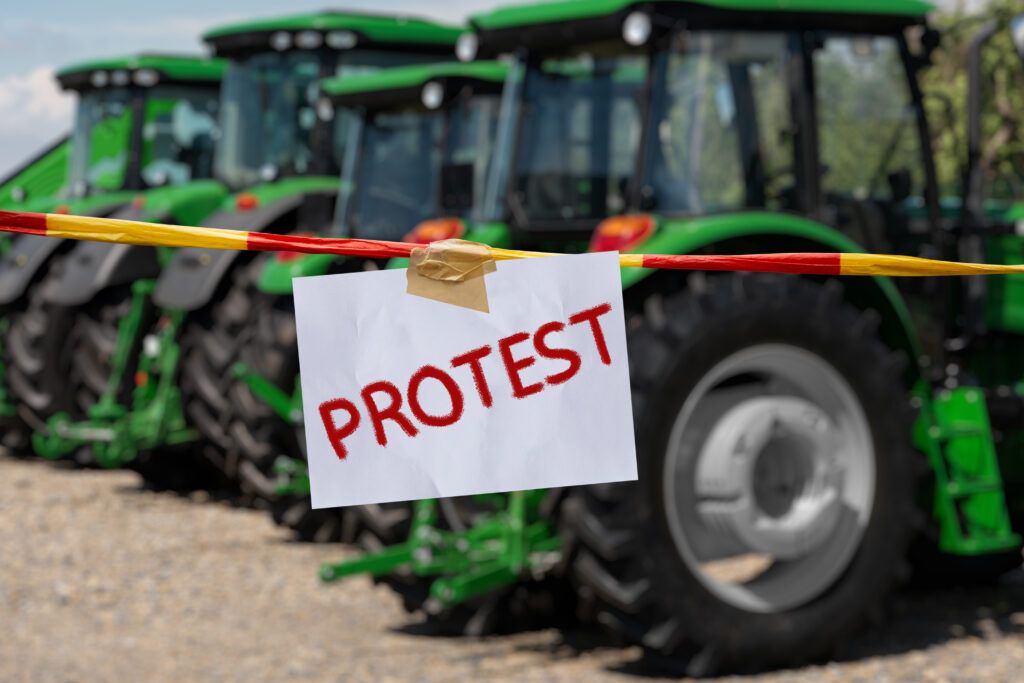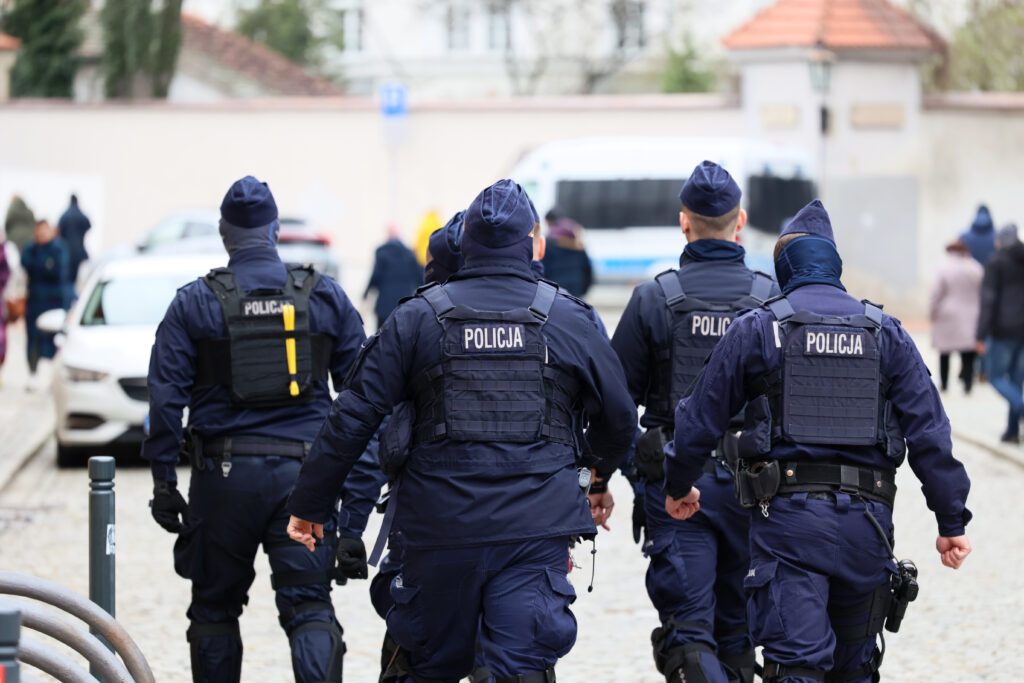- The District Court in Łask acquitted three people charged in connection with the farmers’ demonstration in Wartkowice.
- The police accused main organiser of organising a gathering without notification. Two men were charged with obstructing traffic.
- The District Court in Trzebnica dismissed three cases against a total of ten men who participated in a farmers’ demonstration in March 2024.
- Eight of them were accused of violating traffic safety regulations, and two of obstructing traffic.
- The court found that the farmers had participated in legal protests, which naturally entail traffic problems.
The District Court in Łask acquitted three farmers who participated in the protest in Wartkowice. The incident took place on 22 April 2024. The demonstration was a spontaneous gathering and was a reaction to the dissolution of a farmers’ demonstration near the border crossing in Dorohusk on the same day. Three people were charged in connection with the protest: a woman who organised the demonstration and two participants. The organiser was charged with an offence under Article 52 § 2(2) of the Code of Misdemeanours, i.e. organising a public gathering without notification and permission. The two men were charged with obstructing traffic.
All previous protests organised by this group of farmers had been peaceful and without disruption. This was also the case with a spontaneous gathering that took place two months earlier at the same place and at a similar time, when Prime Minister Donald Tusk decided to include selected sections of roads leading to the Ukrainian border and the border crossing in Dorohusk on the list of critical infrastructure. According to the farmers, this was primarily aimed at restricting the protesters’ right to assemble, which was being exercised at that time. Farmers from the Łódź area decided to call a solidarity protest at the junction in Wartkowice.
The same happened during the protest on 22 April 2024. After learning that the mayor of Dorohusk had dissolved a legal protest at the border, the organiser decided to call a solidarity protest. She called a police officer with whom she had previously been in contact during earlier protests. She informed him that a spontaneous protest would take place that day due to the dissolution of the gathering in Dorohusk. The same location where the protests had previously taken place was chosen as the venue for the protest so that the police officers could efficiently ensure security and detours. The police officer took note of this, recording the reason for the gathering in an official memo. Already during the phone call, and repeatedly afterwards, the police officers communicated that, in their opinion, the protest was illegal and that the protesters would be punished with fines. However, they did not give any reasons for these statements, nor did they break up the protest. During the gathering itself, the police officers attempted to obstruct its course, demanding, among other things, that the organiser obtain permission from the road administrator to organise a spontaneous protest. They also decided to refer randomly selected individuals to court for punishment. Such a request was also made against a farmer who accidentally came across the protest while returning from field work. The registration number of his tractor was recorded when he went to ask the officers what was causing the obstruction on the road.
The police officers refused to accept that the reason for the gathering could be solidarity with the farmers protesting at the border. One of the officers did not even know that Dorohusk is located in Poland.
The District Court in Łask decided to combine the cases for joint consideration. During the trial, officers testified that the protest was peaceful. A reporter from Telewizja Republika, who was reporting on the event that day, was also questioned. The public prosecutor did not appear at any of the hearings.
The District Court in Łask decided to acquit the three defendants. It thus ruled that freedom of assembly can also be exercised through spontaneous protests and that the dispersal of the farmers’ protest in Dorohusk was an important event for this social group, with which they could disagree.
In similar cases concerning protests in the Lower Silesian Voivodeship, the District Court in Trzebnica discontinued three proceedings against a total of ten farmers. The demonstration took place in March 2024. During the gathering, the police obstructed the peaceful demonstration by accusing the protesters of violating traffic regulations. Earlier, the Trzebnica County Police Headquarters itself had announced that a protest was planned for that particular day. Participants in the demonstration were identified and given fines. As in the Wartkowice cases, those who did not accept the fines were referred to court for punishment.
The District Police Headquarters in Trzebnica filed a motion with the court to punish a total of ten people. Most were charged with an offence under Article 97 of the Code of Misdemeanours, i.e. violation of traffic safety or order regulations. Two farmers were charged with obstructing or hindering traffic, an offence under Article 90 of the Code of Petty Offences.
The District Court in Trzebnica decided to dismiss the case, pointing out that the defendants’ behaviour did not meet any of the criteria for the alleged offences. They participated in a legal protest, one of many that took place throughout Poland on that day. The form of the demonstration, which involved blocking roads, had been announced in advance by the Independent Farmers’ Trade Union Solidarity, which organised the protests. The police in Trzebnica were also aware of the time and place of the demonstration. In the court’s opinion, the defendants demonstrated peacefully, without destroying property or committing acts of vandalism. The court also noted that demonstrations of this type generally cause traffic disruptions. Furthermore, as the court pointed out, a few weeks earlier, a similar protest by farmers had taken place in the Trzebnica County. However, the police did not file any requests for punishment of the demonstrators at that time.
“Based on many similar proceedings throughout Poland, a dangerous change in the approach of the police and local authorities in the first quarter of 2024 can be observed. Since then, officers have shifted from an approach based on cooperation and attempts to reach an agreement with protesters to one of obstructing peaceful assemblies and conducting proceedings against protesters for offences and misdemeanours. Such a change may constitute a significant interference with the right to freedom of assembly enshrined in the Polish Constitution and a number of international legal acts,” noted Robert Czarnowicz from the Ordo Iuris Centre for Legal Intervention.
Image source: Adobe Stock.


